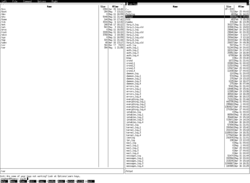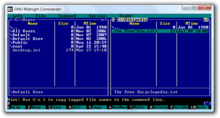- Midnight Commander
-
Midnight Commander 
Midnight Commander running in a terminal window on Ubuntu LinuxDeveloper(s) Miguel de Icaza and the Midnight Commander community Stable release 4.7.5.4[1] / September 12, 2011[2] Preview release 4.8.0-pre2 / September 12, 2011[3] Operating system Unix-like, Windows Type File manager License Free software (GPL) Website www.midnight-commander.org GNU Midnight Commander (mc) is a free cross-platform orthodox file manager and a clone of Norton Commander originally created by Miguel de Icaza.
Midnight Commander is licensed under the terms of the GNU General Public License.
Contents
Design
Midnight Commander is a console application with a text user interface. The main interface consists of two panels which display the file system. It is used in a similar way to many other programs run in the Unix shell[citation needed]. Arrow keys control file selection, the insert key is used to select files and the Function Keys perform operations such as renaming, editing and copying files. Later versions of the Midnight Commander additionally have mouse support for easier operation. Such versions are aware of GPM and X terminal emulators (such as GNOME Terminal or xterm) which support mouse reporting. When running inside an X terminal, these versions can update the name of the window in which Midnight Commander runs (if allowed by the terminal emulator).
Midnight Commander's features include the ability to view the contents of RPM package files, to work with common archive formats as if they were simply another directory, and to function as an FTP or FISH client. Midnight Commander also includes an editor called mcedit, which can be executed as standalone program or from Midnight Commander using F4 key. mcedit's features include syntax highlighting for many languages, macros, code snippets, simple integration with external tools, automatic indentation, mouse support, clipboard and the ability to work in both ASCII and hex modes. Users also have the option to replace mcedit with the editor of their choice (Options Menu>Configuration>[Don't] Use Internal Edit).
Midnight Commander can also rename groups of files, unlike a number of other file managers that can only rename one file at a time. This is convenient for manipulating large collections of files, e.g. to make them conform to a new naming convention. Midnight Commander can also move files to a different directory at the same time as it renames them. It lets the user specify the original and resulting file names using wildcard characters. This makes the power of regular expressions available for renaming files, with a convenient user interface. In addition, the user can select whether or not to utilize "shell patterns" or "globs" (automatic grouping of wildcards). All of these features are available by using the File > Rename/Move menu selection. (Pressing F1 would then produce a brief explanation of the options, including examples of how to use wildcards.)
Midnight Commander is based on versatile text interfaces, such as Ncurses or S-Lang, which allow it to work on a regular console, inside an X Window terminal, over SSH connections, RS-232 interface (for embedded devices) and all kinds of remote shells.
Unicode support
Native support for UTF-8 locales for Unicode was added in 2009 to development versions of Midnight Commander. Support is now part of the latest stable version.
See also
References
External links
- Official website
- The Midnight Commander for win32 – a distribution for Microsoft Windows
- The Midnight Commander for Mac OS X – Universal Binaries from the official sources
File managers Unix-like DOS Windows Altap Salamander · CubicExplorer · Directory Opus · FAR Manager · FreeCommander · SpeedCommander · STDU Explorer · Total Commander · Windows Explorer · WinSCP · xplorer² · XYplorer · ZTreeWinMac OS BeOS-like OpenTracker · TrackerCross-platform Categories:- Free file managers
- Free FTP clients
- Files transferred over shell clients
- GNU Project software
- Orthodox file managers
- S-Lang (programming library)
- Curses (programming library)
- Linux file system-related software
- Unix file system-related software
- Windows software
Wikimedia Foundation. 2010.

